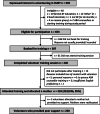Implementing a successful proactive telephone breastfeeding peer support intervention: volunteer recruitment, training, and intervention delivery in the RUBY randomised controlled trial
- PMID: 34852839
- PMCID: PMC8638340
- DOI: 10.1186/s13006-021-00434-9
Implementing a successful proactive telephone breastfeeding peer support intervention: volunteer recruitment, training, and intervention delivery in the RUBY randomised controlled trial
Abstract
Background: The RUBY randomised controlled trial demonstrated the benefit of proactive telephone peer support in promoting breastfeeding continuation in a setting with high breastfeeding initiation, where typically this is difficult to achieve. This paper describes the implementation and delivery of the peer support intervention with a focus on recruitment, training, and support of peer volunteers, and includes a description of the key components of the calls.
Methods: Data collection occurred between December 2012 and June 2016 in Melbourne, Australia. Volunteers completed enrolment forms at the training session and recorded data related to each call in a Call Log maintained for each mother supported. Data were summarised using descriptive statistics and responses to open-ended questions analysed using content analysis.
Results: A total of 693 women expressed interest in the peer support role, with 246 completing training, that is, 95% of whom supported at least one mother. Each supported a mean of two mothers (range 1 to 11). Training session topics included respecting individual values, using positive language, confidence building, active listening, empathetic support, and normal baby behaviour. There were 518 periods of support where at least one call was made between a volunteer and a mother to whom she was allocated. Of the 518 periods of support, 359 Call Logs (69%) were returned. The 359 call logs recorded a total of 2398 calls between peers and mothers. Call length median duration was 12 min (range 1 to 111 min). Volunteers perceived the most valued aspects of the calls were the provsion of 'general emotional support' (51%) and 'general information/discussion about breastfeeding' (44%). During the first call, mothers raised questions about 'nipple pain/ damage' (24%) and 'general breastfeeding information' (23%). At ≥12 weeks postpartum, issues raised related to 'normal infant behaviour' (22%), 'feed frequency' (16%), and 'general breastfeeding information' (15%). Volunteers referred women to other resources during 28% of calls, most commonly to the Australian Breastfeeding Association.
Conclusions: Our findings demonstrate that the RUBY trial was feasible and sustainable in terms of recruiting volunteers who were willing to participate in training and who proceeded to provide peer support. Call content was responsive to the evolving breastfeeding information needs of mothers and the provision of emotional support was perceived by volunteers to be important.
Trial registration: Australian New Zealand Clinical Trials Registry, ACTRN 12612001024831 .
Keywords: Breastfeeding; Implementation; Peer support; Telephone support.
© 2021. The Author(s).
Conflict of interest statement
The authors declare that they have no competing interests.
Figures
Similar articles
-
Proactive telephone-based peer support for breastfeeding: a cross-sectional survey of women's experiences of receiving support in the RUBY randomised controlled trial.BMJ Open. 2020 Oct 30;10(10):e040412. doi: 10.1136/bmjopen-2020-040412. BMJ Open. 2020. PMID: 33127637 Free PMC article.
-
Volunteers' experiences of providing telephone-based breast-feeding peer support in the RUBY randomised controlled trial.Public Health Nutr. 2020 Nov;23(16):3005-3015. doi: 10.1017/S136898002000124X. Epub 2020 Jun 30. Public Health Nutr. 2020. PMID: 32600489 Free PMC article. Clinical Trial.
-
Breastfeeding peer support by telephone in the RUBY randomised controlled trial: A qualitative exploration of volunteers' experiences.PLoS One. 2020 Aug 6;15(8):e0237190. doi: 10.1371/journal.pone.0237190. eCollection 2020. PLoS One. 2020. PMID: 32760148 Free PMC article. Clinical Trial.
-
Ringing Up about Breastfeeding: a randomised controlled trial exploring early telephone peer support for breastfeeding (RUBY) - trial protocol.BMC Pregnancy Childbirth. 2014 May 28;14:177. doi: 10.1186/1471-2393-14-177. BMC Pregnancy Childbirth. 2014. PMID: 24886264 Free PMC article. Clinical Trial.
-
Peer counselors for breastfeeding mothers in the hospital setting: trials, training, tributes, and tribulations.J Hum Lact. 2003 Feb;19(1):72-6. doi: 10.1177/0890334402239737. J Hum Lact. 2003. PMID: 12587648 Review.
Cited by
-
Is proactive telephone-based breastfeeding peer support a cost-effective intervention? A within-trial cost-effectiveness analysis of the 'Ringing Up about Breastfeeding earlY' (RUBY) randomised controlled trial.BMJ Open. 2023 Jun 8;13(6):e067049. doi: 10.1136/bmjopen-2022-067049. BMJ Open. 2023. PMID: 37290948 Free PMC article. Clinical Trial.
-
Use of volunteers in early years interventions for parents: A scoping review of roles and the extent of evaluation research in this area.PLoS One. 2024 Sep 26;19(9):e0305551. doi: 10.1371/journal.pone.0305551. eCollection 2024. PLoS One. 2024. PMID: 39325752 Free PMC article.
References
-
- Forster DA, McLardie-Hore FE, McLachlan HL, Davey M-A, Grimes HA, Dennis C-L, et al. Proactive peer (mother-to-mother) breastfeeding support by telephone (ringing up about breastfeeding early [RUBY]): a multicentre, unblinded, randomised controlled trial. EClinical Med. 2019;8:20–28. doi: 10.1016/j.eclinm.2019.02.003. - DOI - PMC - PubMed
-
- McFadden A, Gavine A, Renfrew MJ, Wade A, Buchanan P, Taylor JL, Veitch E, Rennie AM, Crowther SA, Neiman S, MacGillivray S, Cochrane Pregnancy and Childbirth Group Support for healthy breastfeeding mothers with healthy term babies. Cochrane Database Syst Rev. 2017;2(2):CD001141. doi: 10.1002/14651858.CD001141.pub5. - DOI - PMC - PubMed
-
- Hoffmann TC, Glasziou PP, Boutron I, Milne R, Perera R, Moher D, Altman DG, Barbour V, Macdonald H, Johnston M, Lamb SE, Dixon-Woods M, McCulloch P, Wyatt JC, Chan AW, Michie S. Better reporting of interventions: template for intervention description and replication (TIDieR) checklist and guide. Br Med J. 2014;348(mar07 3):g168. doi: 10.1136/bmj.g1687. - DOI - PubMed
Publication types
MeSH terms
LinkOut - more resources
Full Text Sources
Medical
Miscellaneous



